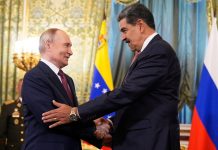
I have read reports claiming that Russian propaganda has been developed based on some super-scientific principles developed in secret FSB (Federal Security Service) psychology labs, which are guaranteed to sway any human brain in a desired direction, Alexei Bayer wrote for Kyiv Post.
But I know plenty of people who watch Russia’s government-owned “Kiselev TV” with no damage to their brains. They have no special immunity, and there is no sanity vaccine. In fact, there is no method to Russian propaganda’s madness. Actually, the opposite is true: Russian television is run entirely for one single viewer, Vladimir Putin – and he is a volatile and whimsical viewer at that.
Its purpose is to show to the Russian president that his foreign policy is brilliant and that he’s winning – in Ukraine, in Syria and in his broader standoff with the West. It changes focus the moment Putin develops his next grand scheme to outsmart his foes. For a year and a half on its television sets Russia was winning both the war in Eastern Ukraine and the hearts and minds of the Ukrainian people. Then, when the war in Donbas came to a standstill and the Russian economy entered a catastrophic crisis, Putin developed a new idea: to insert himself into Syria, help Bashar al-Assad defeat moderate Sunni opposition and then emerge as an arbiter of the Middle East, trading his help in the region for Western recognition of his annexation of Crimea and removal of sanctions. So far, he’s winning there too – at least on the television screen.
As such, “Kiselev TV” is highly damaging to Putin as well as to Russia. It supplies misinformation to the commander in chief, paints an overly bright picture, brushes over complexities and forces him to pile mistake upon mistake in his policy decisions.
At the same time, Russian propaganda seems highly effective among its viewers. They readily believe what they see and hear. While their refrigerators get progressively emptier, their television sets are still winning the battle between those two household appliances hands down.
In the early 1970s, when color television was just starting in the Soviet Union and, like everything else under communism, color TV sets were in short supply, a joke was making rounds around the country. Apparently, the announcer on the nightly color newscast would start the program with a greeting: “Good evening, Comrade Brezhnev.”
Like many such jokes, that one managed to say something important about the way Soviet propaganda functioned. All that was ultimately required of it was to please TV Viewer Number One, i.e., the country’s boss.
That was true in equal measure of Soviet art. Another joke defined socialist realism, the only artistic style in which Soviet writers, artists and film directors were allowed to work, as “a way to glorify Soviet leaders in a way that is accessible to them.”
It all goes back to Stalin, the true father of the nation. By the time he died in 1953, the whole country functioned exclusively for his benefit. People used to stay in their offices all night because there had been a rumor that Stalin, a notorious night owl, sometimes phoned from his study in the Kremlin to a random ministry in the middle of the night. And woe to the minister whose employees weren’t there to answer his pointless calls.
Putin is an heir to that tradition. He doesn’t call people in the middle of the night, but he does watch television – and Kiselev, Soloviev, Tolstoy and a huge number of other people in front of the cameras and behind the scenes are there to make sure he’s pleased with what he sees.
The Soviet Union was built on a myth that communism is a way of the future for all humanity and the Soviets people are the ideological vanguard of that bright future. That was what Viewer Number One expected to see on his color TV screen, too.
Putin’s Russia has a different ideology. Its mentality is based on career criminals’ rules and code of conduct, which divides the world into “us” – the criminal fraternity – and the rest. A member of this fraternity has obligations only to other criminals and doesn’t give a damn about anyone else.
Putin doesn’t care what the Russian people think about him – as long as they don’t show direct signs of disrespect. When Boris Nemtsov publicly called Purin “friggin nuts” he was blatantly murdered, execution-style. But when people rallied against Putin’s return to presidency in 2011-12 under the banner stating “Putin Is a Thief,” he didn’t seem to mind it much.
In fact, Russian criminals proudly call themselves thieves. They also admit that they lie. Lying and perjuring yourself in court is a natural thing for thieves to do – and they brag about it in front of his companions. Which is what Putin did after annexing Crimea – first denying and then bragging about his troops’ involvement.
Russian propagandists are well rewarded for telling the Boss what he wants to hear. There is a traditional role in prisons and labor camps for someone who can spin a good yarn. They too get nice crumbs from the thieves’ table.
There is a paradox here. Soviet propagandists used to work hard to make the masses believe them. Yet, even though the masses lived behind the Iron Curtain, had little access to objective information and couldn’t travel abroad, they were universally cynical about official propaganda claims.
The opposite is true today. Russian propagandists don’t care what their audiences – with the notable exception of Putin – think of them. No attempt has been made to censor the Internet, exclude foreign publications or ban foreign travel. Yet, there is now widespread credulity about Russian propaganda claims.
Putin at least has the excuse of actually initiating policy and getting a kind of circular approval for it, while also refusing to use the Internet. Ordinary citizens do not.
In my view, the explanation for this paradox lies in the fact that communism’s ideological constructs were outside Russian society. The party was an artificial institution that existed in a parallel universe, and its alien messages fell mostly on deaf ears. Putin, by contrast, is Russia’s native son, bone of its bones and flesh of its flesh. Like him, his supporters, all 86% of them, grew up in lumpenized deracinated families in communal apartments, converted barracks and dorms, poorly supervised by their working parents (in the rare instances when they had both of them) and spending most of their childhood in the streets. Like Putin, they became imbued with the criminal ethics by listening to guys who had done time. They admired their strength and freedom, which contrasted with the widespread corruption and cynicism of the Soviet era.
Putin’s conduct, speeches, sense of humor and modus operandi are informed by the thugs’ code of conduct and as such are instantly recognizable by Russian citizens of his generation. They admire him and this is why newscasts designed for his personal consumption resonate so readily with so many of his countrymen.
By Alexei Bayer, Kyiv Post




